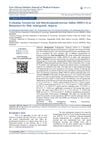 1 citations,
March 2011 in “Infertility”
1 citations,
March 2011 in “Infertility” Hormone imbalances from the pituitary, thyroid, and adrenal glands can cause infertility, but treating these disorders can improve fertility.
 1 citations,
January 2011
1 citations,
January 2011 The document concludes that androgenetic alopecia is common, has a genetic link, and can be diagnosed and treated with medications like finasteride and minoxidil.
 January 2024 in “La Ciencia al Servicio de la Salud y Nutrición”
January 2024 in “La Ciencia al Servicio de la Salud y Nutrición” Spironolactone is effective and safe for treating hair loss, excessive hair growth, and acne.
 April 2022 in “Medicina estética”
April 2022 in “Medicina estética” Minoxidil is the only FDA-approved treatment for female hair loss, with other potential treatments needing more research for effectiveness.

A 15% clove leaf extract shampoo promotes hair growth but is less effective than minoxidil.
September 2021 in “Fertility and sterility” Taking 100 mg of DHEA daily for 16 weeks did not change metabolic and reproductive health significantly but increased certain ovarian markers with minimal side effects.
 April 2019 in “Journal of Investigative Dermatology”
April 2019 in “Journal of Investigative Dermatology” Testosterone affects androgen receptors and lipid storage in cells, while DHEA does not convert to testosterone or affect these receptors in the same way.
 February 2025 in “East African Scholars Journal of Medical Sciences”
February 2025 in “East African Scholars Journal of Medical Sciences” Higher testosterone and DHEA-S levels may be linked to male pattern baldness.
 May 2013 in “Journal of the Egyptian Women's Dermatologic Society (Print)”
May 2013 in “Journal of the Egyptian Women's Dermatologic Society (Print)” High aldosterone and free testosterone levels link to female hair loss; testing aldosterone may predict hypertension risk.
 82 citations,
January 2000 in “Hormone Research in Paediatrics”
82 citations,
January 2000 in “Hormone Research in Paediatrics” DHEA stimulates skin oil glands and could help postmenopausal women, with potential for acne and excessive hair growth treatments.
35 citations,
January 2018 in “Vitamins and hormones” DHEA affects various tissues by interacting with multiple receptors and can be converted into sex hormones.
18 citations,
November 1998 in “Comparative biochemistry and physiology. Part A, Molecular & integrative physiology” Changes in prolactin and DHEA levels are not required for the start of mink hair growth cycles.
 14 citations,
September 2007 in “Steroids”
14 citations,
September 2007 in “Steroids” The study concluded that androstendione and DHEA are important for diagnosing high male hormone levels in women with excessive hair growth.
 11 citations,
August 2000 in “Journal of Endocrinology”
11 citations,
August 2000 in “Journal of Endocrinology” DHEA acts like a male hormone on rat skin glands and doesn't turn into female hormones there.
 1 citations,
February 2022 in “The Journal of Urology”
1 citations,
February 2022 in “The Journal of Urology” Certain drugs like Dutasteride and Finasteride might help fight SARS-CoV-2 by increasing levels of a steroid called DHEA, which can protect the heart and increase nitric oxide to counteract the virus.
1 citations,
January 1988 Topical DHEA safely increases skin oil production.
 July 2024 in “Occupational Medicine”
July 2024 in “Occupational Medicine” Higher cortisol levels are linked to poor coping, while higher DHEA levels are linked to job confidence.
January 2009 in “Chinese Journal of Dermatovenereology of Integrated Traditional and Western Medicine” Yifa compound effectively treats female pattern hair loss and lowers DHT and DHEA levels.
July 2016 in “International journal of biomedical research” Family history and elevated DHEA-S levels are linked to more severe hair loss.
 October 2004 in “DOAJ (DOAJ: Directory of Open Access Journals)”
October 2004 in “DOAJ (DOAJ: Directory of Open Access Journals)” Men with hair loss don't necessarily have higher levels of the hormone DHEA-S, but this hormone tends to decrease with age.
87 citations,
January 1996 in “Journal of cellular biochemistry” Over 30 potential cancer prevention treatments are being tested, with some showing promise in early research.
 56 citations,
October 1983 in “Archives of Dermatology”
56 citations,
October 1983 in “Archives of Dermatology” Some women with acne have higher levels of free testosterone, which might suggest using hormonal treatments for acne.
 48 citations,
January 2000 in “Hormone Research in Paediatrics”
48 citations,
January 2000 in “Hormone Research in Paediatrics” Cytokines and neuropeptides are key in controlling androgen levels, affecting skin and hair conditions.
 36 citations,
October 2009 in “Journal of Investigative Dermatology”
36 citations,
October 2009 in “Journal of Investigative Dermatology” Dihydrotestosterone can be made from dehydroepiandrosterone in skin cells without needing testosterone.
35 citations,
October 2011 in “Medicine and science in sports and exercise” Muscles can make their own androgens, which may help muscle growth.
 35 citations,
March 2012 in “Experimental and Clinical Endocrinology & Diabetes”
35 citations,
March 2012 in “Experimental and Clinical Endocrinology & Diabetes” The conclusion is that accurately identifying the cause of high androgen levels in women with PCOS is crucial and requires specific tests.
 34 citations,
December 2015 in “Neuroscience & Biobehavioral Reviews”
34 citations,
December 2015 in “Neuroscience & Biobehavioral Reviews” Some hormone-related drugs may protect brain cells in Parkinson's disease differently in men and women.
 32 citations,
January 1990 in “Clinical Endocrinology”
32 citations,
January 1990 in “Clinical Endocrinology” Women with female pattern hair loss have higher levels of certain androgens, suggesting increased androgen exposure to hair follicles.
 31 citations,
January 2018 in “Pediatric annals”
31 citations,
January 2018 in “Pediatric annals” Early adrenal gland maturation in young children can be normal, but other serious conditions should be ruled out first.
 29 citations,
February 2017 in “International Journal of Women's Dermatology”
29 citations,
February 2017 in “International Journal of Women's Dermatology” Women with excessive male-pattern hair growth should get a full hormone check-up to find and treat any underlying issues, considering both medical and emotional aspects.






















